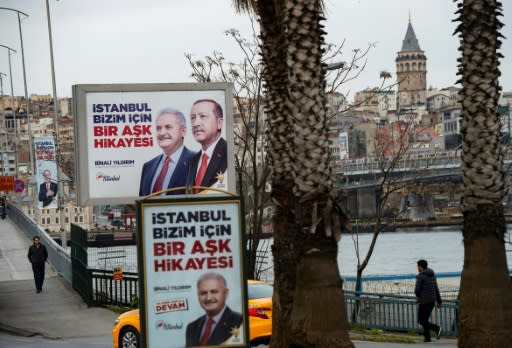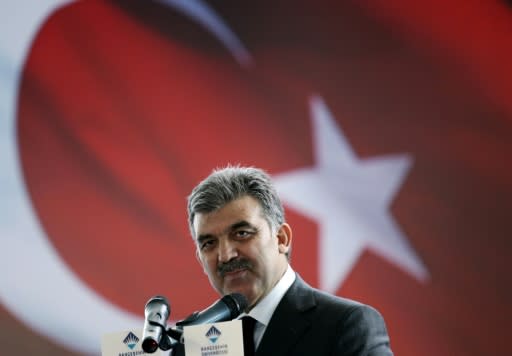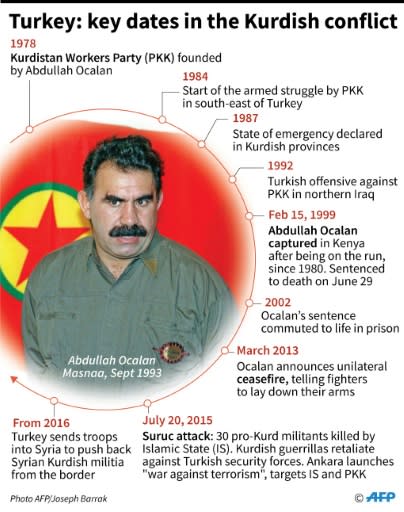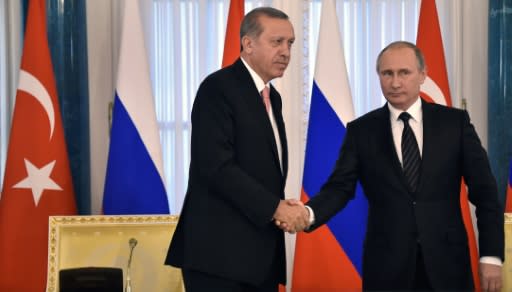Turkey: key dates of Erdogan's rule
Here are key dates in Turkey since President Recep Tayyip Erdogan's Justice and Development Party (AKP) -- on course to win Sunday's local elections -- took power in 2002. - Win in first vote - In its first election bid and just a year after it is founded, the Islamic-rooted AKP scores a crushing victory in November 2002 polls, winning 363 of 550 seats in parliament. The win ends years of political instability in the country but sets off alarm bells in the army-backed secular establishment. AKP co-founder Erdogan is party leader and becomes prime minister in March 2003. - EU accession talks - From 2002 to 2004 Ankara adopts a broad range of democratic reforms, including allowing Kurdish-language broadcasts on public television and abolishing the death penalty. This means that in October 2005 it can begin talks with the European Union (EU) on joining the body. The process later stalls, however, amid rows over rights and the rule of law. - AKP president - In August 2007 lawmakers elect as president Abdullah Gul who founded the AKP with Erdogan. It is the first time an Islamist candidate is named to the highest office, raising concern among the opposition and army generals who vow to defend the secular order. - Anti-Erdogan protests - In May 2013 security forces crack down on demonstrators who staged a rally against government plans to redevelop a park near Istanbul's Taksim square. The protest quickly grows into nationwide demonstrations against Erdogan -- accused of an authoritarian and Islamist drift -- but peter out after a month. Erdogan is elected president in August 2014 with 52 percent of a vote held for the first time by universal suffrage. The AKP wins legislative elections in June 2015 but loses its overall parliamentary majority. Four months later, it wins back its majority in a new vote. - Kurdish rebellion resumes - In July 2015 the outlawed Kurdistan Workers Party (PKK) breaks a unilateral ceasefire with the Turkish army and fighting resumes in an insurgency that has left more than 40,000 people dead since 1984. The country becomes the target of attacks attributed to Kurdish militants or the Islamic State (IS) group, fighting across the border in Syria. - Failed coup, then purges - Renegade soldiers attempt a coup in July 2016 but it is swiftly crushed, leaving around 250 dead on both sides, not including the plotters. Erdogan blames the uprising on exiled US-based Muslim cleric Fethullah Gulen and his movement. In an unprecedented crackdown, around 55,000 people are arrested and more than 140,000 fired or suspended from their jobs. The government imposes control over the army whose political influence ebbs. - Making up with Moscow - In August 2016 Erdogan cements relations with Russian President Vladimir Putin, one of the main allies of the Syrian regime battling opposition rebels and IS jihadists since 2011. Their meeting restores trust after Turkey shot down a Russian jet over the Syrian-Turkish border in late 2015. Two weeks later Turkey launches a major military operation in northern Syria, driving IS fighters from several cities. Turkey also targets Kurdish militia groups in Syria which it considers allies of PKK militants. - Erdogan re-elected - In June 2018 Erdogan wins sweeping new powers in a decisive victory at presidential polls, taking 52.6 percent of the vote and scuppering predictions that his popularity was on the wane. His AKP also holds on to its overall majority in parliament, albeit only with the help of a pact with nationalist allies. Erdogan implements a new system agreed in a 2017 referendum that dispenses with the prime minister post, replacing the parliamentary set-up with an executive presidency and giving him the power to appoint cabinet ministers. People walk past election banners of Turkish President Tayyip Erdogan and AK Party's mayoral candidate for Istanbul, Binali Yildirim, in Istanbul In August 2007 lawmakers elect as president Abdullah Gul who founded the AKP with Erdogan, the first time an Islamist candidate is named to the highest office Chronology of the Kurdish conflict since the creation of the PKK In August 2016 Erdogan cements relations with Russian President Vladimir Putin, one of the main allies of the Syrian regime battling opposition rebels and IS jihadists since 2011





